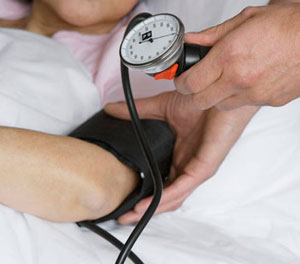 What is Hypotension
What is Hypotension
Hypotension, more commonly known as low blood pressure, is experienced when the flow of blood exerts a lower amount of pressure on artery walls than usual (less than 90/60 systolic pressure). Some persons naturally have a low blood pressure that is normal and safe while other cases which involve symptoms may be extreme and hazardous. When blood pressure is too low, nutrients and oxygen are not carried to vital organs (especially the brain) as quickly as needed. Some signs of low blood pressure include:
- dizziness and lightheadedness or fainting; when these symptoms occur upon standing it is referred to as called orthostatic hypotension or postprandial hypotension if this condition follows consumption of a meal
- chest pain (angina) or a heart attack
- organ failure caused by persistent low blood pressure and shock which may occur in the kidneys, liver, heart, brain, and lungs
Medicines such as diuretics, alpha or beta blockers (blood pressure lowering medicines), Parkinson’s treatments, tricyclic antidepressants, and certain erectile dysfunction medicines (when combined with drug for heart disorders). The following medical conditions may induce low blood pressure:
- women who are pregnant
- diabetics, or those with low blood sugar
- underactive thyroid
- heart problems such as arrhythmia or heart failure
- liver disease
- relaxation or dilation of blood vessels
- persons who are overheated or suffer from a heat stroke
Serious health issues which may be linked to sudden drops in blood pressure include:
- severe bleeding
- a raise or drop in body temperature
- heart disease which may result in failure
- blood infections (particularly sepsis)
- extreme hydration or persistent vomiting, diarrhea or high body temperatures (fever)
- allergic reaction or anaphylaxis
How is Hypotension Treated?
Some cases of low blood pressure can be avoided by standing up more slowly, eating smaller meals throughout the day, or wearing compression stockings to prevent pooling of blood and to increase circulation. Patients should drink an adequate amount of water to stay hydrated and may need to increase consumption of salt. More severe cases may require a blood transfusion (if caused by blood loss), or intravenous fluids and prescribed medicines (fludrocortisone or midodrine).
 What is Hypotension
What is Hypotension